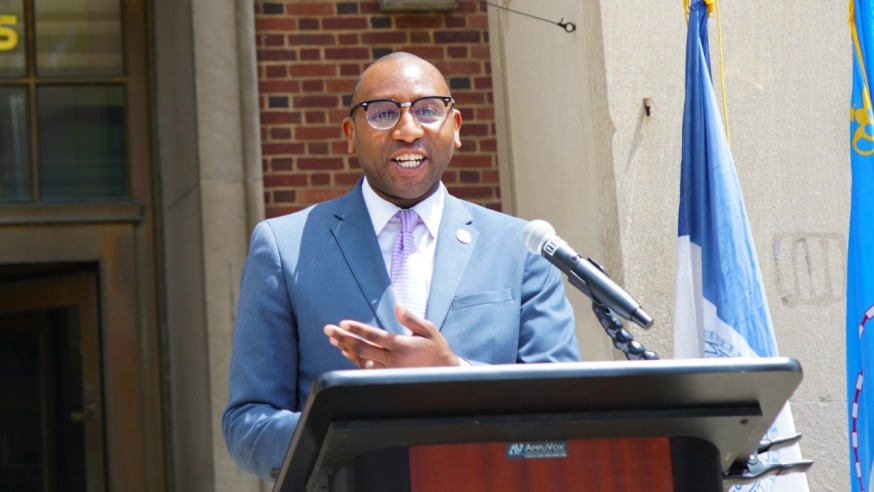
Queens Borough President Donovan Richards (Queens Borough President’s Office)
Aug. 9, 2021 By Allie Griffin
Queens Borough President Donovan Richards is calling on the state legislature to allow community boards to meet remotely for the duration of the pandemic.
Richards penned a letter to Senate Majority Leader Andrea Stewart-Cousins and Assembly Speaker Carl Heastie Thursday requesting that they pass legislation that would allow community boards the flexibility to meet remotely.
Community boards have been required to meet in person since June 25, when Governor Andrew Cuomo ended his executive order declaring a state of emergency due to COVID-19. The expiration has meant that meetings must again be hosted for the public to witness in person, as part of the state’s Open Meetings Law (OML).
“Amid the rise of the dangerous Delta variant, Queens’ Community Boards have rightfully expressed concerns about meeting in-person again,” Richards wrote. “As leaders of the New York State Legislature, we respectfully request you consider revising the Open Meetings Law for the duration of the pandemic.”
Richards’ letter, which was signed by several Queens community board chairs, follows an earlier letter sent out by Queens Community Board 6 Chair Alexa Weitzman to elected officials.
Weitzman informed lawmakers that CB6 would not be holding its meetings in-person and would continue to hold them remotely. She cited concerns over the highly contagious delta variant.
“The executive order might have ended, but the pandemic is not over,” she told the Queens Post last week.
The variant has driven up cases of COVID-19 across the city, leading health officials to strongly recommend all people wear masks indoors regardless of their vaccination status. The city also will require customers to be vaccinated to enter restaurants, bars, gyms and entertainment venues starting next week.
Chairs from 12 of the borough’s 14 community boards signed onto Richards’ letter, along with several community board managers.
The concern follows an in-person Manhattan community board meeting on July 26, which was the source of two fully-vaccinated attendees testing positive for COVID-19.
A bill has been introduced in both the Assembly and Senate that would allow public bodies like community boards the flexibility to either continue to hold virtual meetings or hold a hybrid of in-person/virtual meetings in accordance with the Open Meetings Law.
The legislation has yet to be brought to the floor for a vote since the legislature is currently not in session.
As the Delta variant spreads, our community boards are rightfully concerned about in-person meetings resuming. Along with nearly every #Queens board, we’re calling on the State Legislature to revise the Open Meetings Law for the duration of the pandemic.
Let’s put safety first. pic.twitter.com/VM4NA0JMN9
— Queens Borough President Donovan Richards (@QnsBPRichards) August 6, 2021
3 Comments

If the vaccines and mask work these individuals have nothing to worry about. If the world is reopening and people are returning to work then these politicians should as well. If they can have their food delivered or their packages or can go out to dinner or attend concerts then these individuals can certainly return to the office. If you feel you cannot then find another job or career.
If average Jane and Joe
must be vaccinated and
are encouraged to take
public transportation,
The same should apply to elected officials
Absolutely. If people are returning to work then the individuals who are elected to represent them should as well. Enough remote. Time to go back to real life. If you are not able to then step down so we the people may elect individuals who are not afraid to their job and are willing to do it properly.